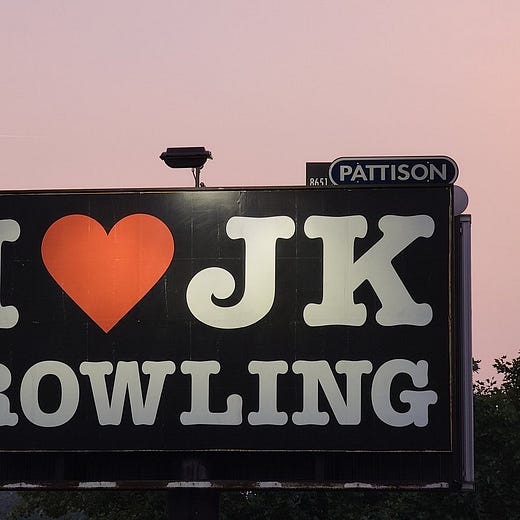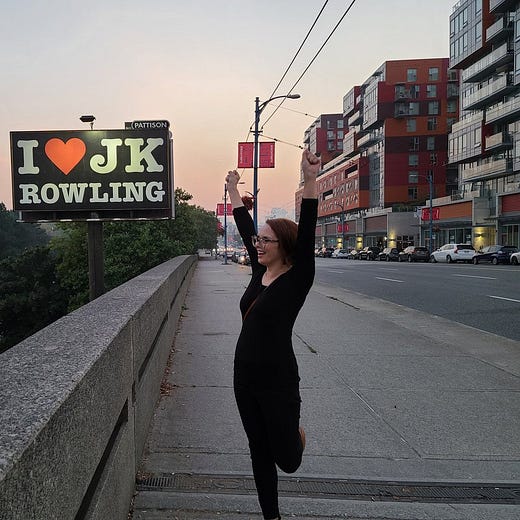Q&A: Why I bought an "I Love J.K. Rowling" billboard in Vancouver
The Line speaks with Amy Eileen Hamm, who funded a controversial billboard in Vancouver
Amy Eileen Hamm generated national headlines this week with a billboard on Hastings St. in Vancouver that read "I <3 J.K. Rowling." Within 30 hours, the billboard was removed by Pattison Outdoor Advertising, who told the sign's creators and funders that it was in violation of the company's standards. Hamm, a health-care worker and mom, says she has been involved with the "gender wars'' for several years as one of the founders of Gender Identity YVR (GIDYVR). The group highlights what they believe is a threat to sex-segregated spaces like female prisons and rape shelters posed by unrestricted self-identification by men claiming to be women. Hamm spoke to The Line's Jen Gerson by phone.
Q: I'll just start off with the obvious question: Why did you decide to place a billboard saying "I <3 J.K. Rowling" in Vancouver?
A. I have a couple of reasons. One to show solidarity with J.K. Rowling who suffered a lot of harassment and abuse after she came out as being critical of gender-identity ideology, and as a huge supporter of sex-based rights. And the other is that I wanted to spur conversations in Vancouver about the issue, because I know it's a very contentious issue in this city and I wish more people would talk about it.
Q. It's tough for me to read this billboard. You can read it as showing solidarity with J.K. Rowling, or you can also read it as trying to generate attention off of issues that I think transgender rights activists would claim is their well being, their sense of personal safety, and security in society. How would you respond to that kind of criticism?
A. I completely disagree. Rowling and myself and other women who have spoken out about gender-identity ideology have consistently made it clear that we support equal rights for transgender persons. We don't want them to suffer discrimination, we would like them to live their lives in peace and security. So that's not the issue for us. The issue is the way that self-identification legislation impacts the rights of women and children.
Q. J.K. Rowling is not a benign figure in the culture at the moment, and signalling an allegiance with her signals an allegiance with a set of ideological presuppositions with regards to gender and identity and sex-based rights. I can understand why people who are on the transgender side of this particular debate would be angry at J.K. Rowling for insinuating that self-identity laws creates the implication that transgender people are predatory or are seeking to harm women, when in fact, the opposite is usually true.
A. I think the problem with that reasoning is that a lot of people who are feeling that way are basing what they've heard other people saying about what J.K. Rowling has said, rather than her actual words. So if you were to read her essay about why she got into the sex and gender debate, she specifically and clearly states that trans people deserve protection, and that she's not suggesting that they are predatory people. She's suggesting that men — as a sex class — can take advantage of self-identification laws, and that is the crux of the issue. It's not trans people, it's the people that will take advantage of self-identification laws.
Q. If J.K. Rowling's meaning was so plain to you, why do you think that she's become such a controversial figure?
A. I just feel like we're at a point in our culture where things are so polarized, and the transgender activists who are speaking about this issue are so loud and angry that people are afraid to say anything. That's why I'm involved in this as I would like to start nuanced conversations that are sorely lacking on this issue.
Q. But you think that putting up a billboard is nuanced?
A. The billboard itself is not nuanced, but it is an opening to the conversation and I have seen that it has been successful.
Q. J.K. Rowling is getting a lot of flak right now for the latest book in her crime series Troubled Blood because it apparently focuses on a cold case of a woman who was killed by what's described in a review as a "transvestite man."* For someone who has come out publicly making the stances that she has on gender identity, that strikes me is a pretty provocative choice on her part.
A. Yeah, I mean, I guess I would agree that it is provocative. I haven't read it yet. So I can't really speak to any of the context or how this character is portrayed. But clearly Rowling is not afraid to do what she would like to do and write about what she wants to write about.*
Q. Do you think that there is a real substantive threat to women brought about by ... I presume we're talking about cisgendered heterosexual predatory men, abusing (self identification) to gain access to female spaces? Does that seem like one of the bigger threats in the overall scheme of things?
A. There have been allegations of female prisoners — who are arguably the most marginalized people in this country — being sexually assaulted by biological males who are housed with them in female prisons. We've seen Vancouver rape relief lose city grant funding because they don't admit biological males into their rape shelter. We've seen another rape shelter in Vancouver with an, I'm assuming a trans-identified person posting sexual pictures of themselves talking about the other women and the rape shelter. And we've seen the way that women's sports have been impacted by self identification as well. So yes, I do think there is a real threat.
Q. What happened after you put the billboard up?
A. It wasn't until we posted photos of it on Twitter that the outrage started. Within 24 hours there, I have received thousands of threatening and hateful messages on Facebook and Twitter. (Another person involved with the billboard) was actually doxxed and people have been calling his home and business and his home addresses is out there. It has been pretty scary to be honest.
Q. Did you expect that?
A. I knew there would be a degree of backlash because of my experiences (at GIDYVR). The activists in the city get quite angry. And it's not the first time that I've been threatened either. There have been police investigations about death threats, rape threats, threats of violence. Because I've spoken about this issue in the past, so I knew there would be a reaction, but this is definitely the biggest mob that has ever come after me.
Q. When people see an "I <3 J.K. Rowling" billboard I don't think they say: “well, there's a woman open to a conversations about competing sex-based rights.” They're seeing someone who is publicly and self consciously paying allegiance to someone who they perceive to be as transphobic, right?
A. Yeah, yeah, I mean, I take your points. The people who aren't aware of what's going on in the gender wars will see (the billboard) and to them, it's completely innocuous. And when they see the misogynistic backlash, and the level of vitriol that results from this small group of activists that makes them start questioning things, and wanting to know why this is such a toxic debate, and it starts the types of conversations that are quite valuable.
Q. Was getting the backlash part of the point?
A. I don't seek it out, I just know that it's almost like a necessary evil. It's very difficult to have a conversation about this topic. Anytime you do it, there are people who try to stop you from having the conversation. So sometimes this sort of method is what you have to resort to.
Q. What's next for you guys?
A. There has been a lot of hate. There has also been a huge outpouring of support, and actually a lot of people who want to become donors and bring billboards to other cities, not even just in Canada. So I think we, we aren't done and you might see more of these billboards popping up around the world.
Q. One of the unintended consequences of people making these kinds of things such a major issue is that it draws much more publicity and attention towards you, as well as the backlash. That's one of the ironies of the polarization of the culture: If people just ignored (the billboard) that would have been the end of it.
A. Yeah, that is the irony about it. And it's the same when you do events and people work very hard to cancel events, and ultimately, the work that they put into canceling it is a great ticket seller.
This interview has been edited for clarity and concision.
(*Neither Hamm nor Gerson had read Rowling's book at the time of this interview. Other reviews published subsequently have disputed the first review, suggesting Rowling's latest book is nowhere near as controversial as it has been portrayed on Twitter.)
The Line is Canada’s last, best hope for irreverent commentary. We reject bullshit. We love lively writing. Please consider supporting us by subscribing. Follow us on Twitter @the_lineca. Fight with us on Facebook. Pitch us something: lineeditor@protonmail.com






Great article. I don't have an opinion on this topic but it is great to see the "other" side of any issue presented without name calling or hate. Pretty rare these days.
I am a subscriber.
Dan Wright
I understand Jen's point about the aggressive aspect of posting a billboard but I have to admit I've found the debate to be very loud and one-sided. I agree with Ms Hamm that anyone who steps back to consider the implications of unrestricted self-identification is immediately assumed to be a "phobe" of some sort and by implication, is attacking trans rights. I'm impatient with that kind of nonsense but find I do keep silent as a result. So yeah, I admit I laughed out loud when I saw the billboard.